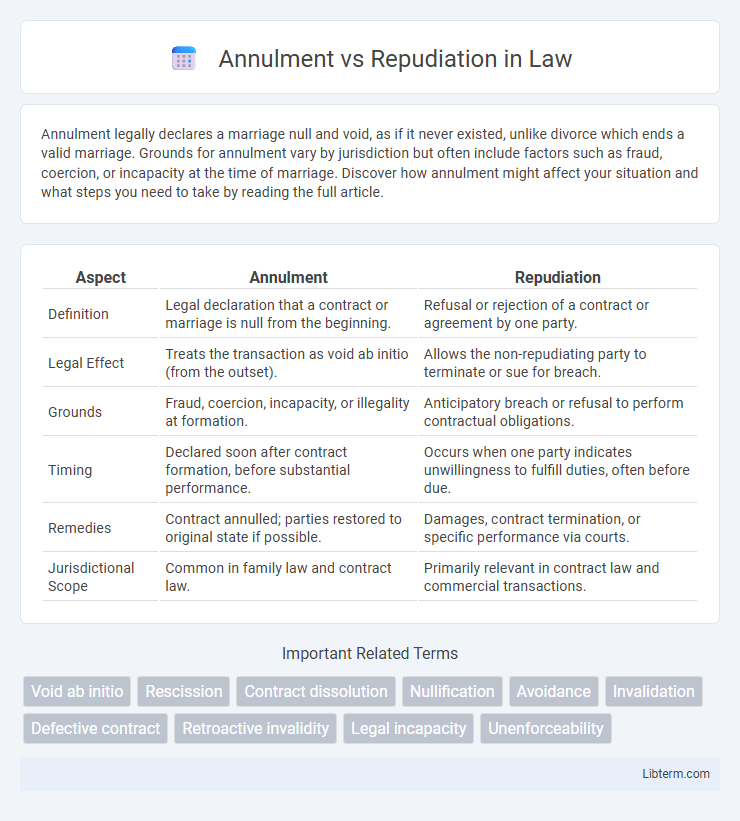Annulment legally declares a marriage null and void, as if it never existed, unlike divorce which ends a valid marriage. Grounds for annulment vary by jurisdiction but often include factors such as fraud, coercion, or incapacity at the time of marriage. Discover how annulment might affect your situation and what steps you need to take by reading the full article.
Table of Comparison
| Aspect | Annulment | Repudiation |
|---|---|---|
| Definition | Legal declaration that a contract or marriage is null from the beginning. | Refusal or rejection of a contract or agreement by one party. |
| Legal Effect | Treats the transaction as void ab initio (from the outset). | Allows the non-repudiating party to terminate or sue for breach. |
| Grounds | Fraud, coercion, incapacity, or illegality at formation. | Anticipatory breach or refusal to perform contractual obligations. |
| Timing | Declared soon after contract formation, before substantial performance. | Occurs when one party indicates unwillingness to fulfill duties, often before due. |
| Remedies | Contract annulled; parties restored to original state if possible. | Damages, contract termination, or specific performance via courts. |
| Jurisdictional Scope | Common in family law and contract law. | Primarily relevant in contract law and commercial transactions. |
Introduction to Annulment and Repudiation
Annulment refers to a legal decree that declares a marriage null and void as if it never existed, often due to factors like fraud, coercion, or incapacity at the time of marriage. Repudiation involves the rejection or refusal to accept a contract or relationship, typically arising in marital or contractual contexts where one party withdraws consent or acceptance. Understanding the fundamental differences between annulment and repudiation is crucial for navigating legal disputes related to marriage validity and contractual obligations.
Definition of Annulment
Annulment is a legal procedure that declares a marriage null and void, as if it never legally existed due to factors such as fraud, coercion, bigamy, or incapacity at the time of marriage. This differs from repudiation, which involves one party rejecting or renouncing the marriage after its formation. Understanding annulment requires recognizing its basis in fundamental invalidity rather than a dissolution process like divorce or repudiation.
Definition of Repudiation
Repudiation in contract law refers to one party's clear indication, through words or actions, that they will not perform their contractual obligations, making the contract unenforceable. This anticipatory breach allows the innocent party to treat the contract as terminated and seek legal remedies. Unlike annulment, which declares a contract void from the beginning due to defects, repudiation concerns a refusal to fulfill the agreed terms after the contract is validly formed.
Legal Grounds for Annulment
Legal grounds for annulment include factors such as fraud, duress, mistake, incapacity, and violation of law at the time of contract formation, rendering the agreement voidable. Courts typically require clear evidence that these defects existed to grant annulment, distinguishing it from repudiation, which involves refusal to perform an existing valid contract. Understanding these grounds is crucial for parties seeking to invalidate a contract based on fundamental flaws rather than breach of contract.
Legal Grounds for Repudiation
Repudiation occurs when one party demonstrates an intention not to fulfill their contractual obligations, constituting a fundamental breach under contract law. Legal grounds for repudiation include clear refusal to perform, conduct indicating an inability to perform, or actions inconsistent with the contract's terms. This principle enables the non-breaching party to treat the contract as terminated and seek remedies such as damages.
Key Differences Between Annulment and Repudiation
Annulment declares a contract void from the beginning due to defects like fraud or incapacity, effectively erasing its legal existence, while repudiation occurs when one party refuses to perform their contractual obligations, allowing the other party to terminate the contract and seek damages. Annulment addresses the contract's validity, rendering it null ab initio, whereas repudiation concerns breach during an ongoing contract, enabling remedies for non-performance. The legal consequences of annulment result in restoring parties to their original positions, contrasting with repudiation's focus on compensation for losses incurred due to breach.
Implications for Parties Involved
Annulment legally renders a contract void from the outset, restoring parties to their original positions and often requiring restitution of benefits exchanged. Repudiation occurs when one party refuses to perform contractual obligations, entitling the innocent party to terminate the contract and claim damages for breach. Both annulment and repudiation significantly impact contractual rights, remedies, and ongoing obligations, influencing dispute resolution strategies and financial liabilities.
Procedures for Annulment
Procedures for annulment involve filing a formal petition with the court to declare a valid marriage null and void due to specific legal grounds, such as fraud, impotence, or lack of consent. The petitioner must present clear evidence substantiating these grounds, and the court conducts hearings to evaluate the validity of the claims. Upon satisfying all legal requirements, the court issues an annulment decree, which legally erases the marriage as if it never existed.
Procedures for Repudiation
Procedures for repudiation involve a clear and unequivocal refusal to perform contractual obligations, which must be communicated to the other party either verbally or in writing. The repudiating party's conduct or statements should demonstrate an intention not to be bound by the contract, allowing the non-repudiating party to treat the contract as terminated. Legal steps following repudiation often include serving notice of breach and seeking damages or specific remedies through courts to enforce contractual rights.
Choosing Between Annulment and Repudiation
Choosing between annulment and repudiation hinges on the nature of the contractual breach and desired legal outcomes. Annulment voids the contract from the beginning due to fundamental defects like fraud or incapacity, effectively erasing obligations, while repudiation occurs when one party refuses to perform, allowing the innocent party to terminate and seek damages. Legal professionals assess factors such as the severity of breach, evidence of intent, and potential for contract restoration to determine the appropriate remedy.
Annulment Infographic

 libterm.com
libterm.com